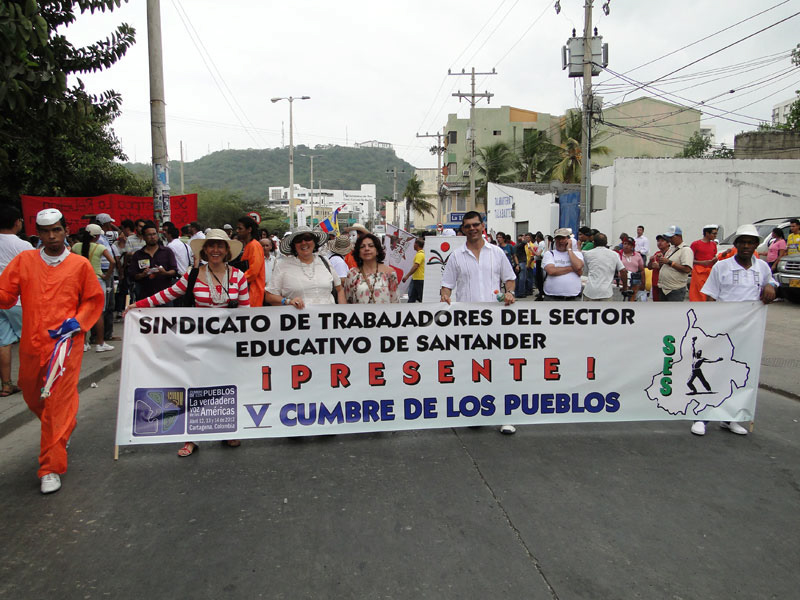Please support our coverage of democratic movements and become a supporting member of rabble.ca.
For the second year in a row, the Conservative government has failed to live up to its moral obligation to analyze the impact of the Canada-Colombia Free Trade Agreement (CCOFTA) on human rights.
The reporting obligation, embedded as a side agreement in the FTA, was hailed by the Liberals as a “new gold standard” for human rights reporting in free trade agreements and touted by the Conservative government as a meaningful way to address human rights accountability in trade. Civil society, labour and human rights organizations feared that it was merely unenforceable window dressing.
Last year’s report, referred to by many as a “non-report,” promised that a real study would come in 2013. It would “provide an analysis of any noticeable changes in trade and in human rights situation in the most active economic sectors stemming from the agreement” and some basic “baseline information” about human rights and trade in Colombia.
Released mid-June, this year’s report falls way short of the promised gold standard and confirms suspicions that the reporting obligation was mere window dressing. It speaks almost exclusively of macroeconomics and trade flows, and — most alarmingly — limits its scope to actions taken by the Canadian government under the FTA’s Implementation Act. Clearly absent from the report is any data or analysis around changes in the human rights situation or the impacts of Canadian investment on human rights in Colombia, rendering the report virtually irrelevant.
One could be forgiven for thinking the government is aware of the human rights issues in Colombia and trying to evade public and media scrutiny on the issue. Rather than publically announcing the release of the report as a good news story for trade and human rights, it surreptitiously tabled it through the back door just before Parliament rose for the summer.
The report outlines a consultation process with stakeholders that is indicative of a deeper issue with the Harper government: contempt for genuine broad-based popular consultation. This is evidenced by its “public call for submissions” for civil society. An unpublicized posting on DFAIT’s website gave participants just over a week to provide input into this important debate. Not surprisingly, no submissions were received. The government went through the motions of a consultation process, but clearly did not provide a meaningful or genuine opportunity for input.
Canadians should be outraged at the government’s lackadaisical report and its disingenuous attempt at public consultation on the serious human rights situation impacting Colombians. They should also question the waste of taxpayer dollars on a process that included expensive Ministerial travel with outcomes as trivial as “designating formal contact points” but did not actually meet its goal of examining how free trade is impacting human rights in Colombia.
Considering the alarming prevalence of human rights abuses, violence, intimidation and assassination in Colombia, the Conservative government has missed an important window of opportunity to hold the Colombian government accountable for the deplorable human rights situation there. It has shown, once again, that corporate rights dominate our government’s agenda, at the expense of human rights and labour concerns.
According to a recent article published in Embassy magazine, “more than one third of Colombia’s Indigenous peoples are threatened with extermination, according to the country’s highest court — a crisis fueled by the violent imposition of megaprojects on indigenous territories. And in 2012, over 280 Colombian trade unionists received death threats and 20 were killed — making it one of the world’s most dangerous places for unionists.”
Last month, two Colombian union leaders from the Colombian Oil Industry (USO) toured various cities in Canada to denounce violations by Canadian oil company Pacific Rubiales Energy. Their final statement denounced the “failure of the governments of Canada and Colombia to comply with labour and environmental agreements and respect human rights, in spite of commitments being ratified by both governments under the CCOFTA.”
The report does highlight one notable piece of information, which contradicts a key narrative of the government’s Americas’ policy. This narrative often used to counter opponents of free trade agreements with troubled countries like Colombia and Honduras, claims that increased mutual prosperity leads to economic development — which in turn improves human rights. However, the report fails to prove this connection, stating instead that “there is no evidence of a causal link between the reductions in tariffs by Canada in accordance with the CCOFTA and changes in human rights in Colombia.”
The report makes it clear that the Canadian government is not walking the talk when it comes to human rights. Its failure to undertake a genuine Human Rights Impact Assessment not only makes a mockery of the principles behind the reporting obligation but also demonstrates the government’s lack of regard for human rights. This report further undermines Canada’s credibility in Latin America and across the globe.
Raul Burbano is the Program Director at Common Frontiers.
Photo: Common Frontiers



